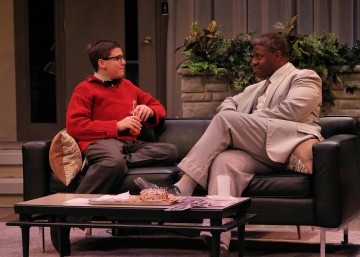


by Graydon Royce
Star Tribune
Feburary 3, 2014
Ron Rabinovitz really did live a charmed childhood, thanks to a politically connected dad who happened to be a Brooklyn Dodgers fan. In conversation, Rabinovitz’s story sounds unreal — about how he became Jackie Robinson’s pen pal, and how he used to run peanut-butter sandwiches and clam chowder for Sen. John Kennedy.
As happens, though, with many well-intentioned efforts to dramatize a story that plays best in mental images, “The Incredible Season of Ronnie Rabinovitz” does not take flight. The production that premiered Saturday at History Theatre in St. Paul twists the ethereal zest of Rabinovitz’s story into a kitchen-sink drama about midcentury politics.
Playwright Eric Simonson does yeoman’s work, crowbarring the two most extraordinary people in young Ronnie’s life into the same modern living room — a sleek, stone and timbered set design perfectly pitched for the era by Rick Polenek. Director Ron Peluso seamlessly paces scenes that alternate between Robinson and Kennedy spending separate evenings with the Rabinovitzes. And a fine cast — notably Mark Benninghofen as Ron’s father, David Rabinovitz, Ansa Akyea as Robinson and Peter Middlecamp as Kennedy — throw themselves into the telling.
However, despite having young Ronnie (Jack Alexander) occasionally step out of time to comment on his remarkable childhood friends, this main character becomes more of a spectator in his own story.
In his Sheboygan, Wis., home, Ronnie watches Robinson argue with David Rabinovitz, an attorney and political operative, about the Democratic Party’s fraught embrace of civil rights in 1960. By working for Kennedy in the Wisconsin primary, Rabinovitz is damaging Hubert Humphrey, whom Robinson prefers. Middlecamp turns on the Kennedy charm even while expressing frustration about Robinson’s political bent (Jackie eventually supported Nixon in 1960).
In fact, Simonson’s finest moment is a man-to-man talk between Robinson and Kennedy. Akyea finds the core of Robinson’s frustration over class, privilege and slick politics. To Robinson, Kennedy was a rich kid from Massachusetts accustomed to getting his way. Robinson, a civil-rights pioneer, was irritated by the assumption that he would fall in line with Kennedy.
One story element that hangs behind the plot involves racist graffiti being spray-painted on David Rabinovitz’s law office. This allows Simonson to inject some Wisconsin color, as a sheriff (E.J. Subkoviak) and a roughneck labor activist (Jim Stowell) stop by the house. Stowell, in particular, spices up the drama, railing against Benninghofen’s Rabinovitz for his handling of a strike against Kohler Industries.
There is something commendable about History Theatre’s desire to ruminate on two of the great personalities of America’s changing society, circa 1960. Given how rare and sweet Ron Rabinovitz’s story is, the details defy the stage’s ability to do it justice. However, in the bargain we are left with one more glance back at the baby boomer’s favorite decade.